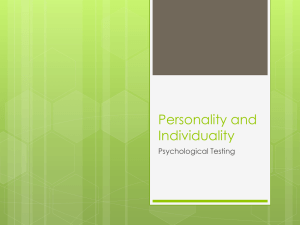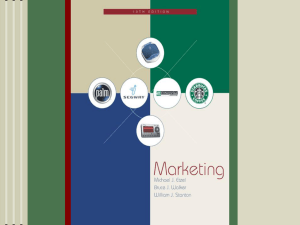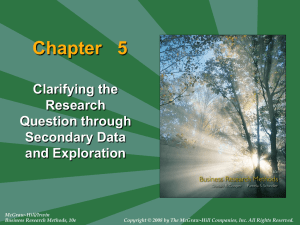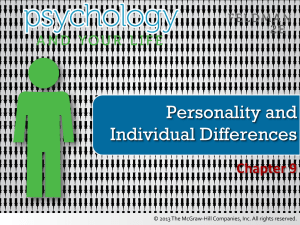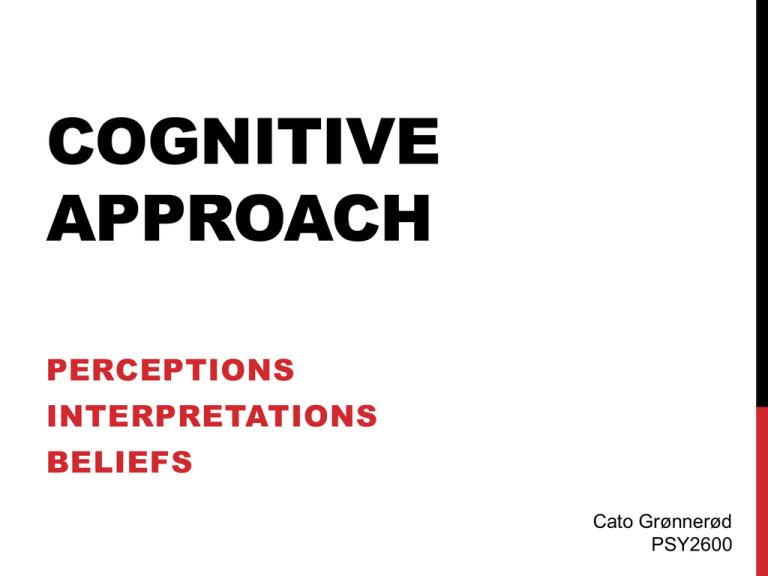
COGNITIVE
APPROACH
PERCEPTIONS
INTERPRETATIONS
BELIEFS
Cato Grønnerød
PSY2600
COGNITION AND
PERSONALITY
PERCEPTIONS
INTERPRETATIONS
GOALS
Cato Grønnerød
PSY1006
INTRODUCTION
Cognitive approaches to personality focus
on differences in how people process
information
Cognition refers to awareness and thinking
as well as to specific mental acts such as
perceiving, interpreting, remembering,
believing, anticipating, attributing
THREE LEVELS OF COGNITION
Perception
• Process of imposing order on information received by
our sense organs
Interpretation
• Process of making sense of, or explaining, events in
the world
Beliefs and desires
• Standards and goals people develop for evaluating
themselves and others
© 2008 The McGraw-Hill Companies, Inc. All rights reserved.
PERSONALITY REVEALED
THROUGH…
Perception
• Field Dependence-Independence
• Pain Tolerance
Interpretation
• Explanatory Style / Attributions
• Automatic Thoughts
• Personal Constructs
Beliefs and Desires
• Outcome Expectations
• Self-Efficacy
• Long-Term Beliefs
© 2008 The McGraw-Hill Companies, Inc. All rights reserved.
PERSONALITY REVEALED
THROUGH PERCEPTION
Field Dependence-Independence
Pain Tolerance and Sensation ReducingAugmenting
© 2008 The McGraw-Hill Companies, Inc. All rights reserved.
FIELD DEPENDENCEINDEPENDENCE
Field independent people
• Have the ability to focus on
details despite the clutter of
background information (relative
to field dependent)
Measures used to assess
field-dependence
• Rod and Frame Test (RFT)
• Embedded Figures Test (EFT)
© 2008 The McGraw-Hill Companies, Inc. All rights reserved.
FIELD DEPENDENCEINDEPENDENCE
Field independent persons
• Favor natural sciences, math, engineering
• More analytical, sees and favors complexity
• More interpersonally detached
Field dependent persons
• Favor social sciences and education
• More holistic, intuitive and contextual
• Attentive to social cues, oriented toward other people
© 2008 The McGraw-Hill Companies, Inc. All rights reserved.
FIELD DEPENDENCEINDEPENDENCE
Field independent people
• Better able to screen out distracting information and
focus on a task
• Police officers better at filtering out distracting info
and deciding when to shoot
Field independent students
• Learn more effectively than field dependent students
in hypermedia-based instructional environment
© 2008 The McGraw-Hill Companies, Inc. All rights reserved.
PAIN TOLERANCE
Aneseth Petrie’s reducer-augmenter theory
of pain tolerance and Sensation ReducingAugmenting
• People with low pain tolerance have a nervous
system that is amplified or augmented to subjective
impact of sensory input
• People with high pain tolerance have a nervous
system that is dampened or reduced effects of
sensory information
© 2008 The McGraw-Hill Companies, Inc. All rights reserved.
PAIN TOLERANCE
Reducers seek strong stimulation, perhaps
in order to compensate for lower sensory
reactivity
Reducers may use substances (nicotine,
caffeine, alcohol, other drugs) to artificially
“lift” their arousal level
© 2008 The McGraw-Hill Companies, Inc. All rights reserved.
PERSONALITY REVEALED
THROUGH INTERPRETATION
Kelly’s Personal Construct Theory
Locus of Control
Learned Helplessness
© 2008 The McGraw-Hill Companies, Inc. All rights reserved.
LOCUS OF CONTROL
Rotter’s “expectancy model” of learning
behavior
• Learning depends on the degree to which a person
values a reinforcer—its reinforcement value
• People differ in their expectations for reinforcement—
some believe they are in control of outcomes,
whereas others do not
© 2008 The McGraw-Hill Companies, Inc. All rights reserved.
LOCUS OF CONTROL
Locus of control describes person’s
interpretation of responsibility for events
External locus of control
• Generalized expectancies that events are outside of
one’s control
Internal locus of control
• Generalized expectancies that reinforcing events are
under one’s control, and that one is responsible for
major life outcomes
© 2008 The McGraw-Hill Companies, Inc. All rights reserved.
LEARNED HELPLESSNESS
Animals (including humans) when
subjected to unpleasant and inescapable
circumstances, become passive and
accepting of a situation, in effect learning to
be helpless
© 2008 The McGraw-Hill Companies, Inc. All rights reserved.
EXPLANATORY STYLE
Tendency that some people have to use
certain attributional categories when
explaining causes of events
Three broad categories of attributions
• External or internal
• Stable or unstable
• Global or specific
© 2008 The McGraw-Hill Companies, Inc. All rights reserved.
EXPLANATORY STYLE
Pessimistic explanatory style
• Emphasizes internal, stable, and global causes for
negative events
• Associated with feelings of helplessness and poor
adjustment
Explanatory style is stable over time
• r=.54 for questionaire and coding from diaries 52
years later
© 2008 The McGraw-Hill Companies, Inc. All rights reserved.
EXPLANATORY STYLE
Explanatory Style and Depression
• Internal: Everything is my own fault
• Stable: This is how it’s always been and always will
be
• Global: This is how my life is, I’m not good at anything
Cognitive therapy will try to change these
attributions
© 2008 The McGraw-Hill Companies, Inc. All rights reserved.
AUTOMATIC THOUGHTS
Automatic thoughs precede and cause
emotions
•
•
•
•
•
Automatic apprisals of situations
Specific and discrete
Rapid and immediate
Tied to depression
Modifying the thought will change the emotion
KELLY’S PERSONAL
CONSTRUCT THEORY
Human Nature
• Search for meaning
• Lack of meaning creates anxiety
Humans-as-scientists
• People attempt to understand, predict, and control
events
Personal constructs
• Constructs person uses to interpret and predict
events
© 2008 The McGraw-Hill Companies, Inc. All rights reserved.
KELLY’S PERSONAL
CONSTRUCT THEORY
Fundamental Postulate
• “A person’s processes are psychologically
channelized by the ways in which he anticipates
events”
Commonality corollary
• If two people have similar construct systems, they will
be psychologically similar
© 2008 The McGraw-Hill Companies, Inc. All rights reserved.
KELLY’S PERSONAL
CONSTRUCT THEORY
Post-modernism
• An intellectual position grounded in notion that reality
is constructed, that every person and every culture
has unique version of reality, with none having
privilege
Sociality corollary
• To understand a person, must understand how she
construes the social world
© 2008 The McGraw-Hill Companies, Inc. All rights reserved.
KELLY’S PERSONAL
CONSTRUCT THEORY
Clinical application
• Wanted to demonstrate to his clients that the
constructs are hypotheses, not facts
• Problem reformulation
• Role Construct Repertory Test (Rep Test)
• Assess similarities and differences in triads of important
people in a persons life
• Fixed-Role Therapy
• The client plays a role with characteristics different from
them selves
PERSONALITY REVEALED
THROUGH GOALS
People differ in their goals, and these
differences reveal and are part of
personality
Personal Projects Analysis
Self-Efficacy
Mastery Orientation
Regulatory Focus
Cognitive-Affective Personality System
© 2008 The McGraw-Hill Companies, Inc. All rights reserved.
PERSONAL PROJECTS
ANALYSIS
Personality is what structures a person’s
daily life through the selection of goals and
desires, that then determine specific
strategies that people use
Emphasizes the “doing” of personality over
the trait approach’s “having” of personality
Emphasizes active nature of personality
Happiness is related to feeling of control
over one’s projects
EXPECTATIONS
Cognitions than explicitly anticipate future
events
Outcome expectations
• An estimate that a given behavior will lead to a
particular outcome
Self-Efficacy / Efficacy Expectations
• The belief that one can execute a specific course of
action to achieve a goal
SELF-EFFICACY (BANDURA)
High self-efficacy beliefs often lead to effort
and persistence on tasks
Self-efficacy and performance mutually
influence one another
Will affect goal setting
”Whether you think you can or you can’t,
you’re usually right”
SELF-EFFICACY
What increases self-efficacy?
• Own experience
• Hands-on experience of relevant behaviour
• Observational learning
• To see others succeed
• Verbal encouragment
• To be told that one is able
• Low emotional activation
• Worries, stress and/or exhaustion decreases self-efficacy
SELF-EFFICACY
Information on Self-Efficacy
• ”It is our duty as human beings to proceed as though
our limits of our capabilities did not exist”
• ”Whether you think you can or you can’t, you’re
usually right”
• “Confidence is what you have before you understand
the problem”
LONG-TERM BELIEFS
It is a dire necessity to be loved or approved
by virtually every significant other person in
the community
One should be thoroughly competent,
adequate and achieving in all possible
respects in order to be worthwile
It is awful and catastrophic when things are
not the way one would very much like them
to be
LONG-TERM BELIEFS
Human unhappiness is externally caused,
and we have little or no ability to control our
own sorrow
Our past history is an all-important
determinant of our present behavior; if
something once strongly affected our life, it
should always have a similar effect
There is invariably a right, precise and
perfect solution to human problems, and it
is catastrophic if this solution is not found
MASTERY ORIENTATION
(DWECK)
”Entity” theory of intelligence
• View their intelligence as unchangeable and fixed
• Having to work hard is perceived as evidence of low
intelligence
”Incremental” theory of intelligence
• Intelligence can be increased through effort and
persistence
• Not threatened by failure
REGULATORY FOCUS (HIGGINS)
Promotion focus
• Concerened with advancement, growth and
accomplishments
• Eagerness, approach and ”going for gold”
Prevention focus
• Concerened with protection, safety, prevention of
failure
• Vigilance, caution, prevention
COGNITIVE-AFFECTIVE
PERSONALITY SYSTEM (MISCHEL)
Personality is an organization of cognitive
and affective activities that influence how
people respond to certain kinds of
situations
Focus on process more than traits
Mental activities such as construals, goals,
expectations, beliefs, feelings, selfregulation, abilities, plans, and strategies
COGNITIVE-AFFECTIVE
PERSONALITY SYSTEM (MISCHEL)
People differ in the distinct organization of
their cognitive and affective processes, and
in their accessability of these processes
”If … then”-propositions
• IF situation A THEN X, IF situation B THEN Y
The psychological situation organizes
behavior
INTELLIGENCE
Achievement versus aptitude views of
intelligence
“g” or general intelligence versus domainspecific intelligences
Widely accepted definition of intelligence
(Gardner, 1983)
• Application of cognitive skill and knowledge to solve
problems, learn, and achieve goals valued by the
individual and the culture
Gardner’s theory of multiple intelligences
© 2008 The McGraw-Hill Companies, Inc. All rights reserved.
EMOTIONAL INTELLIGENCE
Goleman
Traditional measures of intelligence predict
school performance, but not outcomes later
in life, such as occupational attainment,
salary, marital quality
Emotion intelligence strongly predicts these
life outcomes
© 2008 The McGraw-Hill Companies, Inc. All rights reserved.
EMOTIONAL INTELLIGENCE
Emotional intelligence includes a set of five
specific abilities
• 1. Awareness of our own feelings and bodily signals,
being able to identify our own emotions, and make
distinctions
• 2. Ability to regulate emotions, especially negative
emotions, and to manage stress
© 2008 The McGraw-Hill Companies, Inc. All rights reserved.
EMOTIONAL INTELLIGENCE
• 3. Ability to control one’s impulses, direct attention
and effort, delay gratification, and stay on task toward
goals
• 4. Ability to decode social and emotional cues of
others, empathy
• 5. Ability to influence and guide others without
incurring anger, resentment
© 2008 The McGraw-Hill Companies, Inc. All rights reserved.
SUMMARY AND EVALUATION
Cognitive approaches to personality focus
on differences in how people process
information
People differ in how they think, perceive,
interpret, remember, believe, desire, and
anticipate events in their lives.
Personality psychologists are interested in
these differences as well as characteristics
of cognition that all humans share
© 2008 The McGraw-Hill Companies, Inc. All rights reserved.
COGNITIVE THERAPY
In the 1950s behavioural theory and therapy
(Skinner etc.) was prominent
In the 1960s other theorists (esp. Aaron
Beck) proposed the importance of
thoughts/cognitions
Albert Ellis added the emotional dimension
and the “rationalisation” of thoughts and
feelings
Since then, many other theorists and
models
MAIN ELEMENTS IN COGNITIVE
THEORY
Negative automatic thoughts
Negative schemas/negative schema content
• Leads to process of logical errors/cognitive distortions
Content negative with respect to
• Self
• World
• Future
SCHEMAS
Are permanent
Long term reference material about things
in the world
A schema is like a box that contains the
results of previous experiences as
interpreted by the person
• Outcome expectations
The content of the schema can be positive
or negative or a mixture
COMMON NEGATIVE SCHEMA
CONTENT
Nature of self: I am no good
Integrity of self: I am unsafe/will come to
harm
Nature of social world: I am or will be alone
Nature of the world: The world is
bad/against me
Nature of others: Other people are
bad/against me
SCHEMA PROCESS
STREAM OF CONSCIOUSNESS
(Includes awareness of
sensations)
AUTOMATIC
THOUGHTS
ACTIVATING
EVENT
Emotional
Response
SCHEMAS
Behavioural
Response
LOGICAL ERRORS
Errors in making conclusions from sensory
input
Also known as “cognitive distortions”
Not errors in perception, but errors in
interpretation
Misinterpretation or non-objective
interpretation
TYPES OF LOGICAL ERRORS
Catastrophization
• More dire than justified
• Unjustified negative prediction
Overgeneralization
Personalization
• Invalid assumption of responsibility
• Mind-reading
TYPES OF LOGICAL ERRORS
Selective abstraction
•
•
•
•
Biased weighting
Not considering all the facts
Black & white thinking
False absolutes
Arbitrary thinking
• “Shoulds”
• Emotional reasoning
WHICH LOGICAL ERROR?
Activating event
Belief or thought
Referee
awards
Penalty
He’s
useless
- Invalid allocation of
responsibility
- Overgeneralisation
- Biased Weighting
Emotional
onsequence
C
Anger
- Must or Should
Emotional Reasoning
WHICH LOGICAL ERROR?
Emotional
onsequence
Activating event
Belief or thought
C
Bike
Smash
My career is
over, this is
the end
Depression
Catastrophisation
- More dire than justified
- Unjustified negative
prediction
- Overgeneralisation
(External attribution)
WHICH LOGICAL ERROR?
Activating event
Going
to a
party
Belief or thought
I’ll
probably
embarrass
myself
Catastrophisation
- Biased Weighting
- More dire than justified
- Unjustified Negative Prediction
Emotional
onsequence
C
Anxious
WHAT GOES WRONG?
We make logical errors in our childhood
We develop early maladaptive schemas
We make logical errors after Activating
(Critical) Events
• Have frequent negative automatic thoughts
We believe in and use dysfunctional
strategies
GOALS OF THERAPY
In the Moment
• Change logical errors to appropriate logic
• Reduce the frequency of automatic thoughts
• Change the balance of schema content from negative
to positive
• Help the client change their behaviour
GOALS OF THERAPY
Later in Therapy
• Change logical errors to appropriate logic in more
pervasive way
• Change schema content
• Build new schema content
• Revise memories
• Change meta-cognitions regarding behavioural
strategies



